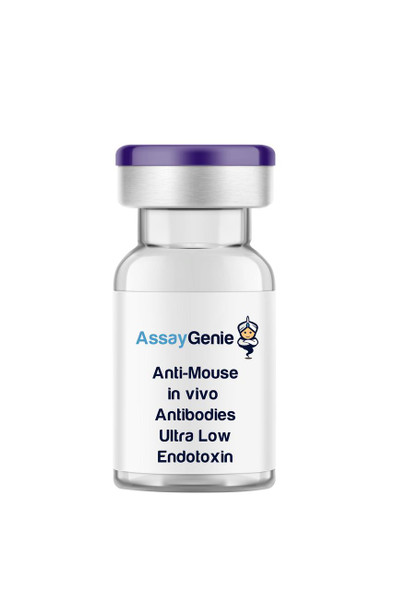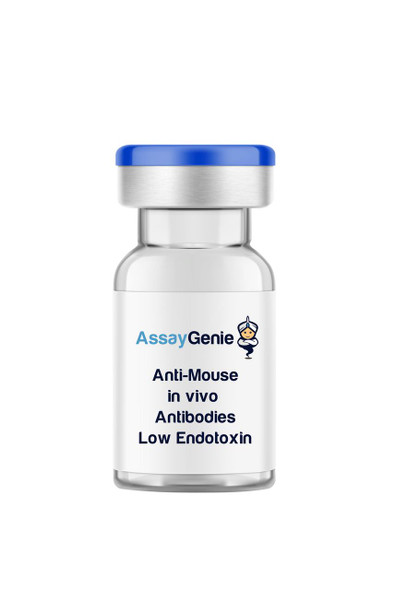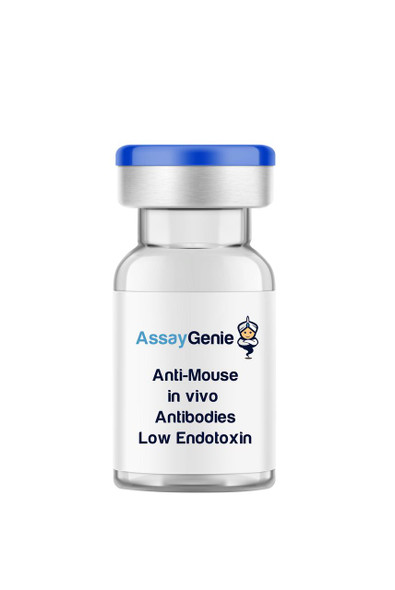Anti-Mouse CD366 (Tim-3) In Vivo Antibody - Low Endotoxin
- SKU:
- IVMB0097
- Product Type:
- In Vivo Monoclonal Antibody
- Clone:
- RMT3-23
- Protein:
- Tim-3
- Isotype:
- Rat IgG2a kappa
- Reactivity:
- Mouse
- Synonyms:
- Havcr2
- Research Area:
- Immune Checkpoint & Cancer Biology
- Endotoxin Level:
- Low Endotoxin
- Host Species:
- Rat
- Applications:
- Blocking
- Applications:
- CODEX
- Applications:
- FC
- Applications:
- IF Staining
- Applications:
- IHC
- Applications:
- IHC FF
Description
| Product Name: | Anti-Mouse CD366 (Tim-3) In Vivo Antibody - Low Endotoxin |
| Product Code: | IVMB0097 |
| Size: | 1mg, 5mg, 25mg, 50mg, 100mg |
| Clone: | RMT3-23 |
| Protein: | Tim-3 |
| Product Type: | Monoclonal Antibody |
| Synonyms: | Havcr2 |
| Isotype: | Rat IgG2a κ |
| Reactivity: | Mouse |
| Immunogen: | This antibody was produced using recombinant mouse TIM-3 |
| Applications: | B, FC, IF Staining, IHC, IHC FF, PhenoCycler® |
| Formulation: | This monoclonal antibody is aseptically packaged and formulated in 0.01 M phosphate buffered saline (150 mM NaCl) PBS pH 7.2 - 7.4 with no carrier protein, potassium, calcium or preservatives added. |
| Endotoxin Level: | < 1.0 EU/mg as determined by the LAL method |
| Purity: | ≥95% monomer by analytical SEC >95% by SDS Page |
| Preparation: | Functional grade preclinical antibodies are manufactured in an animal free facility using only In vitro protein free cell culture techniques and are purified by a multi-step process including the use of protein A or G to assure extremely low levels of endotoxins, leachable protein A or aggregates. |
| Storage and Handling: | Functional grade preclinical antibodies may be stored sterile as received at 2-8°C for up to one month. For longer term storage, aseptically aliquot in working volumes without diluting and store at -80°C. Avoid Repeated Freeze Thaw Cycles. |
| Applications: | B, CODEX®, FC, IF Staining, IHC, IHC FF |
| Recommended Usage: | FC The suggested concentration for CD366 antibody (clone RMT3-23) for staining cells in flow cytometry is ≤ 1.0 µg per 106 in a volume of 100 µl or 100µl of whole blood. Titration of the reagent is recommended for optimal performance for each application. |
| Reactivity: | Mouse |
| Host Species: | Rat |
| Specificity: | Clone RMT2-23 recognizes an epitope on mouse Tim-3. |
| Antigen Distribution: | Tim-3 is expressed on activated Th1 and Tc1 lymphocytes, CD11b+ macrophages, Tregs, NK cells, and mast cells. |
| Immunogen: | This antibody was produced using recombinant mouse TIM-3 |
| Concentration: | ≥ 5.0 mg/ml |
| Endotoxin Level: | < 1.0 EU/mg as determined by the LAL method |
| Purity: | ≥95% monomer by analytical SEC >95% by SDS Page |
| Formulation: | This monoclonal antibody is aseptically packaged and formulated in 0.01 M phosphate buffered saline (150 mM NaCl) PBS pH 7.2 - 7.4 with no carrier protein, potassium, calcium or preservatives added. |
| Preparation: | Functional grade preclinical antibodies are manufactured in an animal free facility using only In vitro protein free cell culture techniques and are purified by a multi-step process including the use of protein A or G to assure extremely low levels of endotoxins, leachable protein A or aggregates. |
| Storage and Handling: | Functional grade preclinical antibodies may be stored sterile as received at 2-8°C for up to one month. For longer term storage, aseptically aliquot in working volumes without diluting and store at -80°C. Avoid Repeated Freeze Thaw Cycles. |
Tim-3 antibody, clone RMT3-23, recognizes T cell immunoglobulin and mucin domain-containing protein 3 (TIM3, also known as CD366), a TIM family member of immunoregulatory proteins. Tim-3 is a 60kDa type I transmembrane protein with an extracellular immunoglobulin and mucin-like domain and a cytoplasmic tyrosine phosphorylation motif. Tim-3 is expressed by IFNg-producing Th1 CD4 and Tc1 (cytotoxic) CD8 T cells1, regulatory T cells (Tregs)2, myeloid cells3, NK cells4, and mast cells5. Tim-3 is an inhibitory molecule that limits Th1-mediated inflammatory diseases, including a model of central nervous system inflammation (experimental autoimmune encephalomyelitis, EAE)1, inflammatory bowel disease (IBD)6, and type I diabetes7. Tim-3 is also proposed to induce immunological tolerance7, promote Th1 apoptosis8, and regulate macrophage activation1. In addition, Tim-3 is upregulated on tumor-infiltrating lymphocytes, and coblockade of Tim-3 and immune checkpoint inhibitors, such as PD-1, is currently being investigated in clinical trials for the treatment of cancer9.
| Technical Datasheet: | View |
| Protein: | Tim-3 |
| Function: | May play a role in the development of immune responses and the development of Th1-mediated responses |
| Ligand/Receptor: | Putative ligand on resting CD4+ lymphocytes |
| Research Area: | Immunology, Inhibitory Molecules |
Meet the team!
Shane Costigan
Territory Manager & Team Lead
Abdul Khadim
Sales Executive







